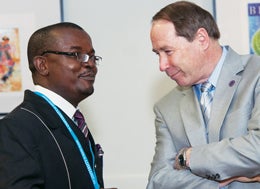So the World May Live as One
 Lawyer Amos Ogbonnaya has taken to heart and taken home the methods he learned at URI’s Center for Nonviolence and Peace Studies’ International Nonviolence Summer Institute. Last year, he twice dissuaded would-be revenge attackers in his town of Okota in Southeastern Nigeria.
Lawyer Amos Ogbonnaya has taken to heart and taken home the methods he learned at URI’s Center for Nonviolence and Peace Studies’ International Nonviolence Summer Institute. Last year, he twice dissuaded would-be revenge attackers in his town of Okota in Southeastern Nigeria.
“Shortly after I returned from URI in June 2013,” Ogbonnaya, 47, reported in an email, “violence erupted between my community and a neighboring community over a jointly owned community market.
“An urgent meeting of all village heads and community chiefs was summoned, to take up the weighty decision of whether to go to war with our neighboring community for destroying our section of the market.”
He spoke out, suggesting a delegation visit the chief of the hostile community to seek explanations. Many saw his recommendation as cowardice, and the chief turned it down. To avert further escalation, Ogbonnaya quickly petitioned the state government for an all-stakeholders conference. Once the king and chiefs of both communities met, an accord was reached.
Not only were his compatriots surprised at the success of his strategy, but also, “They were shocked by my change of attitude and approach, because in the past I would be the one to mobilize the youths for war,” he wrote.
Ogbonnaya was so impressed with the conflict resolution strategies he had learned that he returned here this past summer to learn how to train others.
He was one of 70 participants from 17 countries who attended the increasingly popular Summer Institute this year, either to learn Kingian Nonviolence techniques or to become certified to teach them. It’s one of the only university-based programs in the world offering similar conflict resolution training. In 12 years, more than 600 people from 35 countries—including some of the most violent in the world—have become certified nonviolence trainers at URI, taking the program back to the places it’s most needed.
“They journey here from sometimes life-threatening circumstances,” says Paul Bueno de Mesquita, a professor of psychology and director of the Center. “We are having an important global impact preparing leaders who create significant change.”
 Home
Home Browse
Browse Close
Close Events
Events Maps
Maps Email
Email Brightspace
Brightspace eCampus
eCampus


